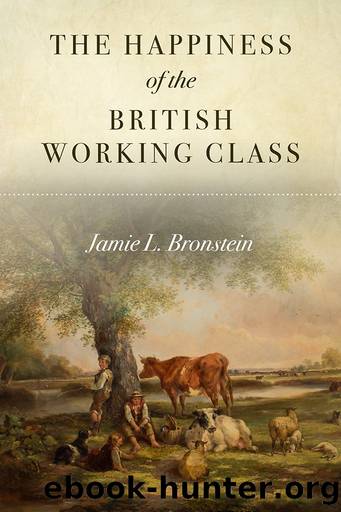The Happiness of the British Working Class by Jamie L. Bronstein;

Author:Jamie L. Bronstein;
Language: eng
Format: epub
Publisher: Stanford University Press
Published: 2022-06-15T00:00:00+00:00
An anonymous weaver whose short memoir was published in the Kendal Mercury in 1841 described a life of great abstemiousness, hard work, and self-improvement through saving and through mechanicsâ institutes. Although he made no reference to happiness in the sense of joyousness, he equated well-being with economic self-sufficiency: âYou must cease paying attention to those men who tell you that happiness is to come from others, and not from yourselves; depend upon it, you have more power over your own happiness than any other person or persons.â127 John Passmore Edwardsâs autobiography embodied high moral seriousness; âDo the best for the mostâ is the epigram that appears on the workâs title page. Born into a poor Cornish family, Passmore Edwards leveraged ill-paying work as a reporter into the purchase of a series of magazines. When these failed, he made paying back his creditors the pole star of his existence. He served on committees promoting peace and free trade and temperance; he gave lectures for mechanicsâ institutes on the importance of dedicating oneâs life to good causes.128 After finally achieving financial success, Passmore Edwards decided to repay society, not out of philanthropy but out of duty, which he considered to be prior to, and superior to, philanthropy. He donated buildings for twenty-four public libraries, and a number of mechanicsâ institutes, hospitals, asylums, convalescent homes, and even drinking fountains, all with the guiding philosophy that national strength depended on developing the abilities of the British people.129 âI entertain an idea that every sunbeam that kisses the earth enriches the earth, and that every disinterested act performed by one person for the benefit of another person enriches the performer or receiver, or both, and survives both.â130
Finally, some who saw fulfillment of duty as the central value to be maximized in life embraced neither politics nor religion. The tailor Thomas Carter, born in 1792, explicitly traded his own enjoyment for a good life based on the fulfillment of duties. As a young child, he was frequently ill, and found childrenâs games exhausting. His parents put him to work knitting and doing other household chores. While he found these responsibilities unpleasant, he credited them with keeping him on the path to respectability.131 Carter remembered avoiding other children at school and staring out the window, âalmost losing myself in vague yet delightful anticipations of the happiness which I then hoped to realize even in this life. This, however, has proved to be a waking dream; yet it was a dream so delightful, that I could wish to have it repeated, almost at the certain expense of a similar disappointment.â132 At first, Carter thought that if he could just acquire a certain material standard of living, he might acquire happiness. Later, he bitterly chastised himself for ever having entertained such naïve thoughts.133 As an adult, Carter made few friends, since he disapproved of what he considered to be the dissipated habits of people of his class, but he assessed his life positively because he carried out his duties toward his family despite his debilitating chronic asthma and the loss of several of his children.
Download
This site does not store any files on its server. We only index and link to content provided by other sites. Please contact the content providers to delete copyright contents if any and email us, we'll remove relevant links or contents immediately.
The Evidence of Things Not Seen by James Baldwin(234)
A Rome of One's Own by Emma Southon(233)
Executive Order No. 9066: The Terrible Injustice Of 1942 by Sollace Freeman(219)
The Explorers by Amanda Bellows(213)
A Wider Type of Freedom: How Struggles for Racial Justice Liberate Everyone by Daniel Martinez HoSang(193)
A Cultural History of Work in the Age of Empire by Victoria E. Thompson (ed.)(166)
Liberty's Dawn: A People's History of the Industrial Revolution by Emma Griffin(165)
The Grey Eagles of Chippewa Falls by John E. Kinville(159)
Respectability and Reform by Tara M. McCarthy(155)
The Crosswinds of Freedom by James MacGregor Burns(153)
Rethinking White Societies in Southern Africa by Duncan Money(150)
A Troublemaker May Surprise (The Troublemaker Series Book 2) by Genta Sebastian(144)
Evolution of Slavery Through the Ages: A Comprehensive World History of Slavery by PRESS VERITY(134)
Continental Strangers by Gemunden Gerd;(132)
A Teacher's Guide to Ladies of Liberty by Cokie Roberts Amy Jurskis(129)
The Slave Ship, Memory and the Origin of Modernity by Martyn Hudson(127)
Letters From London by Julian Barnes(125)
Beware the Masher by Kerry Segrave(118)
Hunger Dark Pen by Dark Pen(115)
